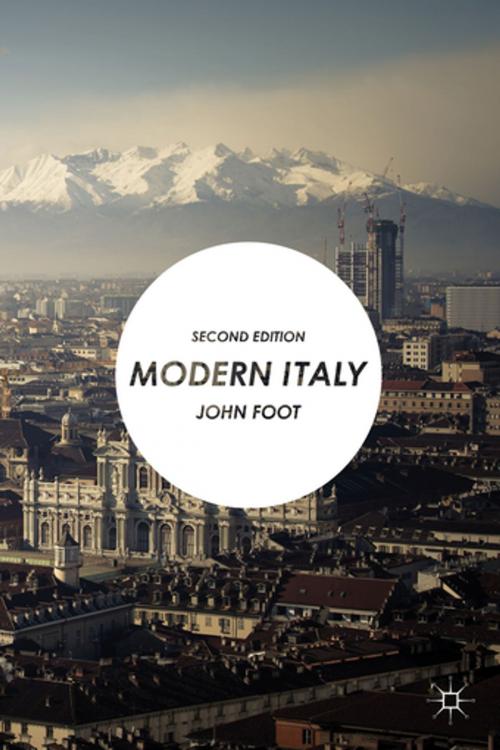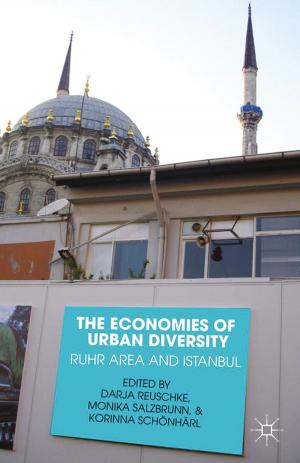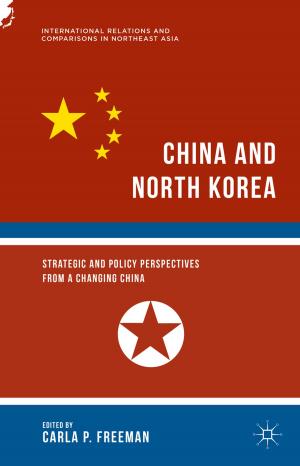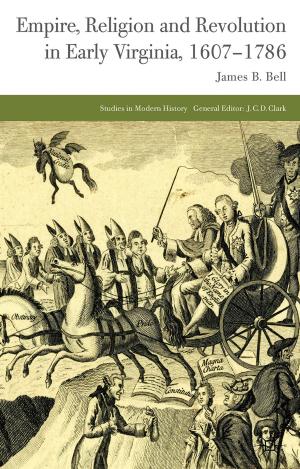| Author: | Professor John Foot | ISBN: | 9781137133656 |
| Publisher: | Palgrave Macmillan | Publication: | May 7, 2014 |
| Imprint: | Palgrave Macmillan | Language: | English |
| Author: | Professor John Foot |
| ISBN: | 9781137133656 |
| Publisher: | Palgrave Macmillan |
| Publication: | May 7, 2014 |
| Imprint: | Palgrave Macmillan |
| Language: | English |
This innovative textbook places Italy at the heart of modern European history, tracing the often difficult relationship between Italians, the State and the Nation. A breeding-ground for radical political and social organisations, Italy saw the emergence of the first Fascist movements seen on the world stage after the First World War. Later, the country produced an anti-fascist movement which helped to create the biggest Communist Party outside of the Eastern bloc. Across this whole period, the political system has been marked by deep legitimation crises, clientelism and corruption. Economically, Italy struggled to keep up with the major industrial powers, but later created a dynamic small business sector which is the envy of the world.
Modern Italy
- uses source material, including contemporary documents and legislation, to explain Italian history, inspire interest and stimulate further discussion
- is organised around broad thematic chapters (The Nation, The State, Economy and Society, Politics) which introduce students to the main areas of debate
- includes maps, tables, and boxed material to assist teaching and learning
- adopts a multi-disciplinary approach making it ideal for teachers and students of European Politics, European Studies, and Italian Studies, as well as for those studying modern Italian history
Clear, concise and well-organised, this essential book introduces readers to the key historical debates, events, and controversies. It helps students to understand the complex nature of Italian history over the last 140 years, without laying out a single and linear version of that history.
Modern Italy
- uses source material, including contemporary documents and legislation, to explain Italian history, inspire interest and stimulate further discussion
- is organised around broad thematic chapters (The Nation, The State, Economy and Society, Politics) which introduce students to the main areas of debate
- includes maps, tables, and boxed material to assist teaching and learning
- adopts a multi-disciplinary approach making it ideal for teachers and students of European Politics, European Studies, and Italian Studies, as well as for those studying modern Italian history
Clear, concise and well-organised, this essential book introduces readers to the key historical debates, events, and controversies. It helps students to understand the complex nature of Italian history over the last 140 years, without laying out a single and linear version of that history.
This innovative textbook places Italy at the heart of modern European history, tracing the often difficult relationship between Italians, the State and the Nation. A breeding-ground for radical political and social organisations, Italy saw the emergence of the first Fascist movements seen on the world stage after the First World War. Later, the country produced an anti-fascist movement which helped to create the biggest Communist Party outside of the Eastern bloc. Across this whole period, the political system has been marked by deep legitimation crises, clientelism and corruption. Economically, Italy struggled to keep up with the major industrial powers, but later created a dynamic small business sector which is the envy of the world.
Modern Italy
- uses source material, including contemporary documents and legislation, to explain Italian history, inspire interest and stimulate further discussion
- is organised around broad thematic chapters (The Nation, The State, Economy and Society, Politics) which introduce students to the main areas of debate
- includes maps, tables, and boxed material to assist teaching and learning
- adopts a multi-disciplinary approach making it ideal for teachers and students of European Politics, European Studies, and Italian Studies, as well as for those studying modern Italian history
Clear, concise and well-organised, this essential book introduces readers to the key historical debates, events, and controversies. It helps students to understand the complex nature of Italian history over the last 140 years, without laying out a single and linear version of that history.
Modern Italy
- uses source material, including contemporary documents and legislation, to explain Italian history, inspire interest and stimulate further discussion
- is organised around broad thematic chapters (The Nation, The State, Economy and Society, Politics) which introduce students to the main areas of debate
- includes maps, tables, and boxed material to assist teaching and learning
- adopts a multi-disciplinary approach making it ideal for teachers and students of European Politics, European Studies, and Italian Studies, as well as for those studying modern Italian history
Clear, concise and well-organised, this essential book introduces readers to the key historical debates, events, and controversies. It helps students to understand the complex nature of Italian history over the last 140 years, without laying out a single and linear version of that history.















